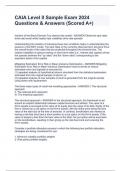Exam (elaborations)
CAIA Level II Sample Exam 2024 Questions & Answers (Scored A+)
- Course
- Institution
CAIA Level II Sample Exam 2024 Questions & Answers (Scored A+) Intuition of the Black-Derman-Toy interest rate model - ANSWER-Observed spot rates drive rate levels while implied rate volatilities drive rate spreads Understanding the intuition of imposing these two conditions helps in unders...
[Show more]



